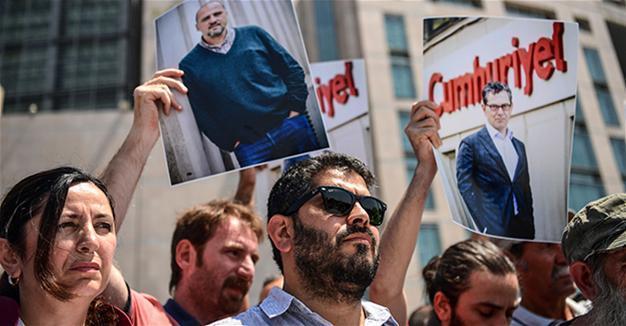Journalist Ahmet Şık slams state of emergency measures in third hearing of daily Cumhuriyet case
ISTANBUL

AFP photo
Journalist Ahmet Şık slammed measures taken in the wake of the last year’s failed coup attempt in his first testimony in the case of daily Cumhuriyet journalists and executives on July 26 in which they are being indicted on terror charges.During the third hearing of the case at the Istanbul 27th High Criminal Court, Şık said the country was going through days that voices telling the truth are being tried to be silenced, adding that the fundamental rights were suspended with the state of emergency imposed right after the failed coup.
Şık noted that tens of thousands of people were detained on Gülen-linked charges and more than 50,000 were arrested, adding that the independence of the judiciary was removed.
“The model that FETÖ [Fethullahist Terrorist Organization] idealized became successful after July 15,” Şık said, referring to the emergency rule.
He also accused the government of engaging in a row with the Gülen network over the control of the state in a process that he claimed would eventually lead to the July 15 coup attempt.
Şık added that the biggest responsible for the network gaining power was the government.
Şık and journalist Nedim Şener were jailed as part of the controversial Oda TV case in 2011. Both spent more than a year in prison while awaiting trial before the publication of Şık’s book, titled “The Imam’s Army,” which focused on the followers of the Gülen network within the police and the judiciary at a time when the network and the government were close. The duo was eventually freed on March 12, 2012.
Şık was again arrested on Dec. 30, 2016, over several tweets and articles for Cumhuriyet and accused of “helping and being a member of terrorist groups.”
The prosecutor seeks between 7.5 and 15 years in prison for Şık for “helping and being a member of the outlawed Kurdistan Workers’ Party [PKK] and the outlawed Revolutionary People’s Liberation Party-Front [DHKP-C].”
Earlier, Cumhuriyet Foundation board member Karasinir was the first to testify on the third day of the hearing.
He said the aim of the case was to silence the daily and intimidate all journalists. Karasinir also stated that he did not use ByLock, an encrypted messaging application allegedly used by members of the Gülen network, adding that he never praised terror in any of his reports.
He said the daily had been fighting against the network for the past 40 years.
According to the indictment, there is a bad intent in the mentality that suggested communication with every Gülenist constituted a crime, Karasinir said.
He said allegations that he talked with suspected ByLock users were not true, adding that he spoke with the suspects in 2013 but the initial release of the application was in 2014.
Turhan Günay, the editor-in-chief of the daily’s book supplement, said he had never been a member of the Cumhuriyet Foundation and was held for 267 days in jail because of phone calls over invitations to book fairs.
He said no foundation member could meddle with the daily’s news content and editorial policy.
















